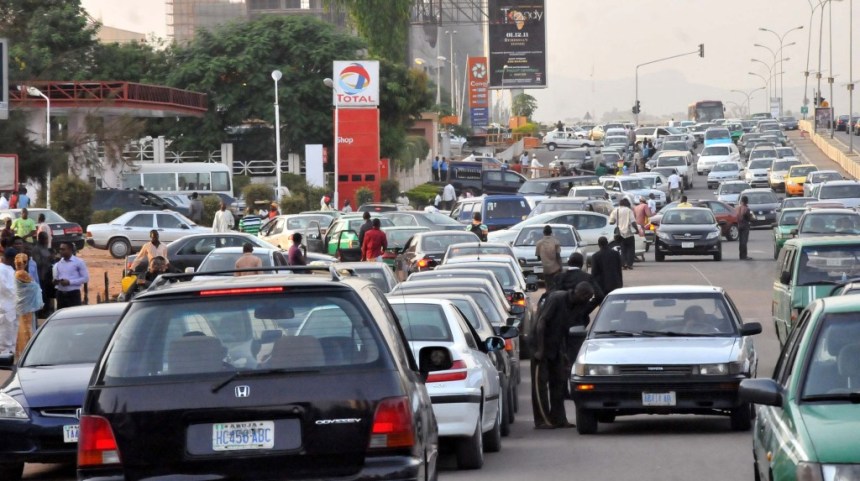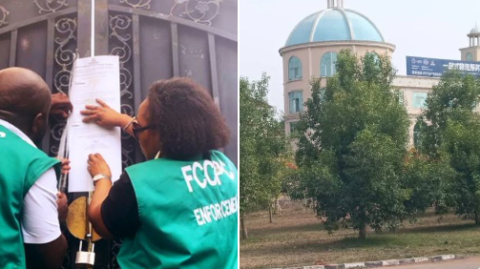There is mounting anxiety in Abuja due to longer fuel queues as the petrol scarcity bites harder in the Nigeria’s capital.
This came on Monday just as motorists in some parts of Lagos, the nation’s commercial capital, resorted to panic buying of fuel as many filling stations on the Island were shut.
Long queues were also reported on the Lagos Island and a few other places in Lagos, giving rise to traffic congestion in the affected areas.
The Guardian reports that the panic began gradually at the weekend when unusual long queues of vehicles at various filling stations in Ikoyi, Victoria Island and Lekki were noticed as residents spent longer period trying to buy the Premium Motor Spirit (PMS popularly called petrol especially in the Lagos Island.
Many had attributed this to increased demand for fuel due to power outage following a fire incident that led to the shutdown of Nigeria’s largest power plant, Egbin, from the national grid, last week.
However, the long queues persisted on Monday morning despite improved power supply. There were long queues on Awolowo road in Ikoyi, which caused gridlock along the axis.
The situation was different on the mainland part of Lagos as queues were barely noticed at filling stations. This posed a challenge for motorists and commuters resuming their daily activities after the weekend break.
Most of the fuel stations visited in the metropolis claimed they were without supply. The few stations that had supply attracted long queues.
From Ojodu-Berger to Lekki, Gbagada, Alapere, Oshodi-Apapa axis, Ajah, Sangotedo, Mile-2, among others, long queues were sighted in filling stations, which in some stations spiraled into the major roads.
Many commuters along the Lekki-Epe Expressway, including Sangotedo and Victoria Garden City (VGC) axis had a hectic time in traffic. On the Island (Ikoyi, Victoria Island and Obalende axis), only a few stations had supply with manageable queues. It was the same situation along the Lagos-Ibadan Expressway.
But there were no queues at filling stations in Mushin, Isolo, Ejigbo, Ikotun and environs. The Guardian, yesterday, gathered that the flash petrol scarcity currently being experienced in Lagos is due to current effort by the Nigerian National Petroleum Company (NNPC) Limited to recall harmful imported petroleum products.
According to sources, most of the petrol imported into the country under the Direct Sale, Direct Purchase (DSDP) contract has a high content of methanol and ethanol, which are outside the official specification of Nigeria’s petrol. “This product is highly harmful to the market,” a source said.
A senior official in the downstream sector confirmed the development, adding that NNPC is currently doing a product tracing to contain the harmful implication in the market.
The fuel situation may be compounded in days to come should the Nigerian Association of Road Transport Owners (NARTO) make good its threat to down tools over rising price of diesel and operating cost.
It said in a statement on Monday that it would withdraw haulage service if the Federal Government failed to urgently address the rising cost of operation that its members were facing.
Top on the list, according to the union, is the ever-increasing cost of diesel, which petrol tankers run on and which is part of the determinants of freight charges. The cost of diesel presently is N430 per litre.
The association’s National President, Yusuf Lawal Othman, in a statement, said members would be advised to ground their haulage tankers if nothing was done to address the matter, describing the business environment as becoming unbearable. “Our people have parked their trucks and more people are going to park theirs,” he said.
While some states, including the Federal Capital Territory (FCT), has been struggling with fuel scarcity despite promises of sufficient petroleum products, Othman said the challenge could escalate across the country.
The association had earlier decried delay in the payment of about N45 billion bridging cost for diesel, demanding an increase in the transportation allowance factored into the pump price of petrol, but the continuation of subsidy payment on petrol meant that the freight cost would remain.
Decrying the prevailing situation, Othman said, “We will tell them (tanker drivers) to park if nothing is done because we can’t operate in such manner. Transporters, whose freight rate is fixed and regulated, cannot sustain the business if nothing is done.
“We can’t operate. We can’t work if nothing is done to increase the freight rate. The condition is unbearable because of the cost of diesel.”
He urged the Nigerian Midstream and Downstream Petroleum Regulatory Authority (NMDPRA) to urgently increase the freight rate to reflect the present cost of Automative Gas Oil (AGO) diesel and spare parts.
According to him, ex-depot cost of diesel soared to N401 per litre on Monday, adding that it might hit N420 per litre at the filling stations if nothing was done urgently.
The Guardian also reports that petrol sufficiency days and stock figures are receding, noting that the NNPC used to boast of 30 to 40- day stock sufficiency and about two billion metres, the record has dipped to 24.02-day sufficiency and about 1,345,338,930 litres stock of petrol.
Quoting from an official document titled: ‘Petroleum Products Stock & Days Sufficiency Report 27th January 2022,’ the from the NMDPRA, it states that Nigeria consumes between 54 million and 60 million litres of petrol daily.
Related









































